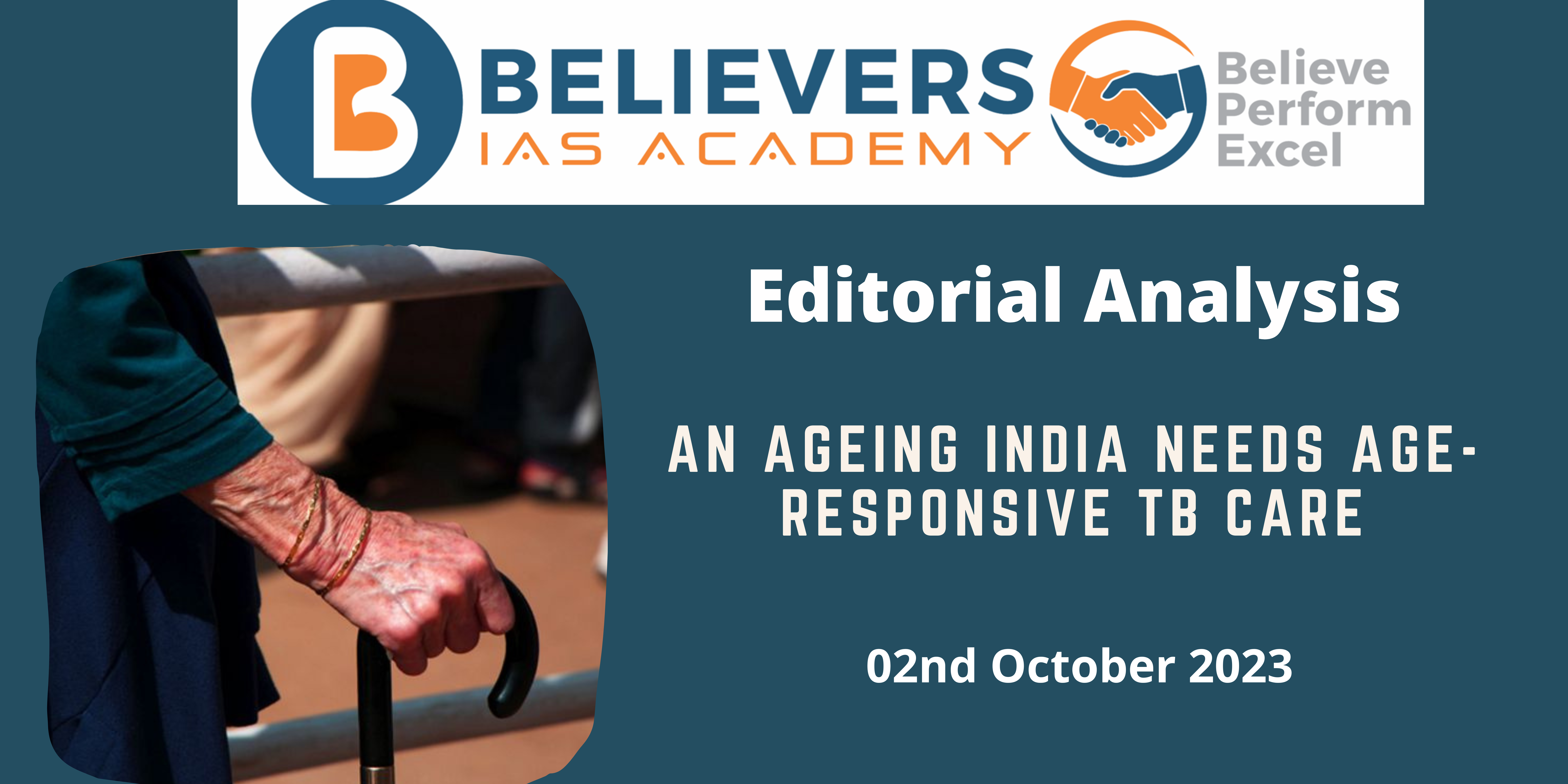An ageing India needs age-responsive TB care
Context:
India is seeing a demographic shift with an increasing proportion of elderly citizens which by default attributes to advancements in healthcare and extended lifespan demands. By 2030, it is estimated that 12.5% of India’s population will be aged 60 and above, compared to the 9% in 2011.
Relevance:
GS – 2 (Health, Government Policies & Interventions, Important International Institutions)
Prelims:
Tuberculosis, BCG vaccine, Indian Demography
Mains Question:
- Discuss the problems and particular healthcare needs of the elderly population in India, with a focus on tuberculosis (TB) and also suggest strategies to counter these challenges and ensure age-responsive care for the elderly. (150 words)
Dimensions of the Article:
- Impact of TB on the Elderly
- Unique Challenges Faced by Elderly TB Patients
- Complexities in TB Management
- Healthcare Accessibility Issues
- Economic Dependence and Stigmatization
- Creating Elder-Friendly TB Care
- Technical and Operational Protocols
- Addressing Socio-Economic Needs
- Data Collection and Analysis
- A Research Agenda
Impact of TB on the Elderly:
- India is facing a substantial burden of tuberculosis patients (over 25 lakh individuals annually and claiming at least 1,000 lives each day).
- The National TB Prevalence Survey of 2021 disclosed an alarming statistics: a prevalence rate of 588 (per one lakh population) among individuals aged 55 and above, significantly higher than the national average of 316.
Unique Challenges Faced by Elderly TB Patients:
- Symptoms of TB, such as cough, fatigue, and weight loss, are often misattributed to other ailments or dismissed as natural consequences of aging.
- Consequently, elderly individuals are at a heightened risk of delayed or missed TB diagnoses.
Complexities in TB Management:
- Once diagnosed, managing TB in the elderly presents multifaceted challenges. Many elderly TB patients contend with multiple comorbidities, particularly diabetes, which complicates treatment due to higher pill counts and increased susceptibility to side effects.
- This can lead to erratic treatment adherence and adverse outcomes, including fatalities. Furthermore, some elderly individuals express a diminished “will to live,” especially in the absence of robust social and emotional support systems.
Healthcare Accessibility Issues:
- Elderly individuals, especially women, encounter specific hurdles in accessing healthcare services. In rural and hilly regions, they struggle with transportation to healthcare facilities, often relying on assistance.
- Access to reliable health information dwindles as their social networks naturally shrink with age. Infrastructure-related challenges, such as inadequate seating at healthcare facilities, further compound these issues. Additionally, many elderly individuals lack access to high-quality, nutritious food, a critical component of recovery.
Economic Dependence and Stigmatization:
- Economic independence diminishes significantly after the age of 60, with many relying on savings or family support. Although some social welfare programs exist for the elderly, they are limited and challenging to access.
- While data on TB-related stigma among the elderly is scarce, it is essential to recognize that ageism exists and negatively impacts the health and social integration of older individuals.
- Some elderly interviewees mentioned deteriorating mental health, exacerbated by feelings of purposelessness, isolation resulting from the loss of loved ones, and anxiety about perceived uselessness.
Creating Elder-Friendly TB Care:
- To provide elder-friendly TB care, a paradigm shift is needed from disease-specific, fragmented care models to holistic approaches that reduce the elderly’s interactions with multiple healthcare providers and facilities.
- Healthcare professionals at all levels must receive training to improve their clinical understanding of TB in the elderly and enhance the management of comorbidities.
- Effective case-finding among the elderly can be facilitated through improved sputum collection and transportation systems, mobile diagnostic services, and active case identification in geriatric outpatient departments and residential facilities.
Technical and Operational Protocols:
- Clear and comprehensive technical and operational protocols are crucial for diagnosing and treating TB in the elderly. These should encompass sample extraction procedures, thorough assessments of comorbidities, and appropriate dosage adjustments.
Addressing Socio-Economic Needs:
- Elder-friendly support protocols must be thoughtfully designed and implemented, with input from elderly TB patients.
- These could include community care models tailored to the elderly, doorstep delivery of medications, peer support and counseling services, special assistance desks at healthcare facilities, and guidance for accessing social support programs.
Data Collection and Analysis:
- Gender- and age-disaggregated data collection and analysis should be conducted to identify TB trends among different age groups, ensuring that the elderly are recognized as a distinct demographic in TB reports.
- Collaboration within the healthcare system should also be strengthened to build elderly-friendly systems.
A Research Agenda:
- It should investigate state-specific trends in case identification and outcomes among elderly TB patients, substance use patterns, drug resistance, comorbidity profiles across regions, uptake of TB preventive therapy in the elderly, and intersections with other equity dimensions like gender, disability, socioeconomic class, and caste.
Way Forward:
Addressing the unique healthcare needs of the elderly population, particularly regarding TB, requires a comprehensive approach. Policymakers, healthcare providers, and society as a whole must prioritize elder-friendly care models, training, and support systems to ensure that our elderly citizens receive the care and respect they deserve.
Conclusion:
The demographic transformation unfolding in India necessitates a renewed commitment to the health and well-being of the elderly. TB, a prevalent and deadly disease, presents distinctive challenges for this demographic. By adopting holistic care models, improving healthcare accessibility, and addressing socio-economic needs, we can pave the way for elder-friendly TB care. Rigorous data collection, research, and collaboration within the healthcare system are vital steps towards building a healthcare system that respects and prioritizes the elderly.



